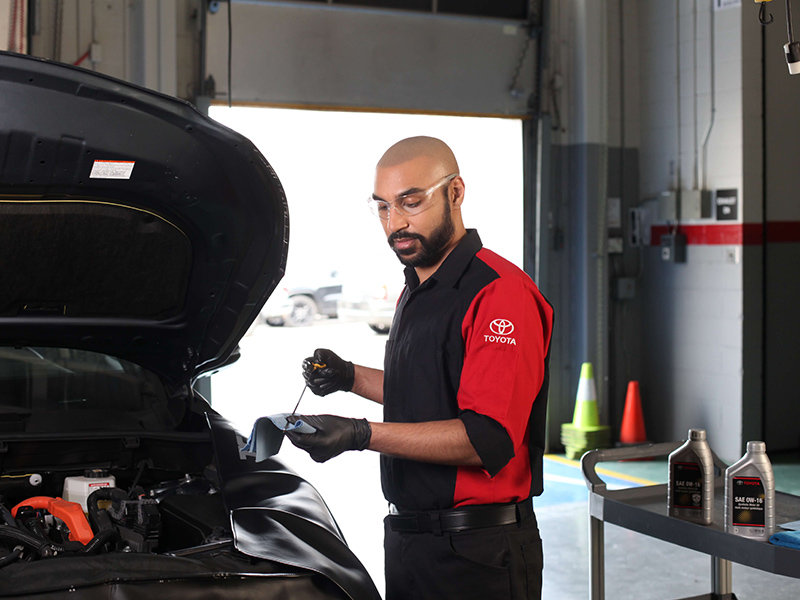
Together, we’re keeping our community on the move.
We’re proud to partner with The Parkside Centre, a vibrant senior community hub that brings life to downtown Sudbury. From crafts and workshops to...
Read more

Regular maintenance is key to ensuring the longevity and efficiency of your vehicle. For Toyota owners, one of the most critical aspects of vehicle maintenance is the oil change. This routine procedure not only keeps your engine running smoothly but also plays a crucial role in the overall health of your car. This article will guide you through the importance of engine oil, how to check oil levels in your Toyota, the best times for oil replacement, specific considerations for Toyota Hybrids, and other useful tips and tricks.
Engine oil is the lifeblood of your car’s engine. It serves multiple vital functions: it lubricates engine components to reduce friction and wear, helps to dissipate heat away from the engine, and acts as a sealant against debris and contaminants. Without proper oil maintenance, your engine could suffer from increased wear, overheating, and even catastrophic failure. Regular oil changes ensure that your engine’s moving parts are always operating under optimal conditions.
Checking the oil level in your Toyota is a simple process that should be done regularly:
Gone are the days when conventional wisdom dictated an oil and filter change every 5,000 kilometres. Modern advancements in engine design and oil technology have significantly extended these intervals, reflecting a major shift in automotive maintenance practices. Today's high-efficiency engines, combined with superior quality oils, allow some vehicles to go as long as 16,000 kilometres or 12 monthes between oil changes. This shift means that the traditional advice of frequent oil changes may no longer apply, underscoring the importance of understanding the specific needs of your vehicle.
Despite these extended intervals, the fundamental importance of regular oil changes remains unchanged. Oil serves as a critical lubricant in your engine, ensuring that moving parts operate smoothly and with minimal friction. Neglecting to change the oil can lead to a buildup of contaminants and sludge, which can cause serious engine damage, potentially voiding warranties and leading to costly repairs or even complete engine failure. Regular oil changes maintain engine health and prevent these severe outcomes.
The schedule for changing oil depends largely on the type of oil used in your vehicle:
Consult your vehicle’s owner's manual or contact your dealership to confirm the recommended oil type and change intervals for your specific model. This is particularly important as vehicle manufacturers may specify different requirements based on the engine design and the vehicle's intended use.
Choosing the right oil viscosity is another vital aspect of maintaining your vehicle’s engine. For example, oils labeled as SAE 0W-8 are designed to enhance fuel economy and ensure smooth starting in cold weather, thanks to their excellent cold startability (indicated by the "0W") and effective high- temperature viscosity (indicated by the "8"). If SAE 0W-8 is unavailable, a temporary substitution with SAE 0W-16 might be acceptable, but it should be switched back to SAE 0W-8 at the next opportunity, ensuring optimal engine performance under varying temperatures and operating conditions.
Toyota Hybrids require the same attention to oil maintenance as traditional gasoline vehicles, but there are some nuances. Hybrids generally operate under less stressful conditions since the electric motor reduces the load on the gasoline engine. However, ensuring the use of the right type of oil—often synthetic—is crucial, as it needs to cope with the unique demands of the hybrid powertrain. Always ensure that the oil filter is also replaced during the oil change to maintain optimal engine cleanliness and efficiency.
Keeping up with oil changes and filter replacements is essential for the health of your Toyota. By maintaining proper oil levels and quality, you ensure that your vehicle runs efficiently, with minimized wear and enhanced longevity. Regular checks and adherence to your specific vehicle’s guidelines will keep your Toyota in top condition for years to come. Always consult your owner’s manual or a professional mechanic if you’re unsure about any maintenance procedures. Remember, a little care goes a long way in the life of your car.

Together, we’re keeping our community on the move.
We’re proud to partner with The Parkside Centre, a vibrant senior community hub that brings life to downtown Sudbury. From crafts and workshops to...
Read more